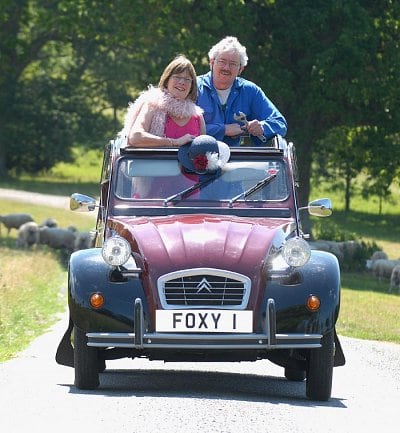If you want to drive a car that looks different, why not consider a classic car?
There are plenty of good looking cars from the 50s, 60s and 70s that hold their own in terms of style and value. Anything much earlier is likely to be too impractical for modern conditions.
Classic cars need to be regularly serviced by a garage that knows how to look after them. Not all garages or dealerships do.
Whilst it may be difficult to find a local garage you can trust, once you do, maintenance costs are generally low compared to a modern car because of the absence of complex on board systems.
Many older cars can be competent ‘daily drivers’ but they may require covered parking to maintain their reliability and value.
Classic Car Buying Tips
Our advice is to
+ Buy a car with good older car parts availability such as an MG, Lotus, Mini, BMW, Citroen or Alfa Romeo.
+ Join FOXY Lady Drivers Club to help you find the right garage specialist to look after the car, to benefit from insurance discounts and to have our Helpdesk on hand to advise you when you have a mechanical problem.
+ Look out for evidence of corrosion. Ask an expert to check an old car out before buying. Depending on the car it may make financial sense to join the relevant owners club to find that expert BEFORE you buy the car of your dreams, not after. It may cost c£30 but this is well worth it to make sure you aren’t buying a dud.
Questions to ask when buying a classic car
Here are some important questions to ask when shopping around for a classic car.
+ The car’s history is important. What has been spent on the car over the past five years for example (or the last 20,000 miles)?
+ Why is the car for sale? Ask for permission to speak to previous owners prior to buying.
+ Ask about difficult to source components such as tyres. Where can you buy parts for example.
The pitfalls of buying a classic car
There are pitfalls when it comes to buying classic cars, as follows.
+ Buying a pretty-looking car on sight without asking an expert to check it over first.
+ The driving experience – make sure you take a long test drive to feel the difference in handling.
+ Not knowing what the likely mechanical/rust problems are with that model.
+ Buying a Maserati and expecting Morris Minor bills.
The pros and cons of owning a classic car
The pros include:
+ Style and individuality.
+ Admiring looks in car parks.
+ Making friends with car owners like you.
+ It’s likely to be an investment – as a rule, classic cars don’t depreciate, providing you look after them.
+ Cost of ownership – insurance is generally much cheaper from a classic car insurer and you’ll get a good discount if you’re a member of a car club.
+ VED tax exemptions – if your car was built before January 1 1973 it’s exempt from road tax and after April next year this’ll apply to one manufactured before January 1 1974.
But there are several significant cons to bear in mind…
+ A vintage/classic car will rust away if you can’t garage it.
+ It’s unlikely to match modern car reliability.
+ It’s unlikely to have power steering (although some cars may have this).
+ It may not have power assisted brakes (which results in a totally different style of driving*).
+ It’s highly unlikely to have air conditioning so de-misting can be quite a problem.
+ Most won’t have central locking, electric windows, sound systems and so on.
+ Unless it’s a 60s super car, it won’t handle as well as a modern car.
+ Parking won’t be as easy.
+ You’ll need extra security if you’re ever parking in a city or out of doors; vintage cars were built before car theft became the problem it is today.
*You need to allow for more braking distance to accommodate old brake technology
_______________________________________
If we haven’t put you off we wish you all the very best of motoring in what we hope becomes a much loved member of the family…. providing you buy a good example of an older car in the first place.
Finally here’s where to join FOXY for the motoring, maintenance and insurance advice you’re surely going to need…





